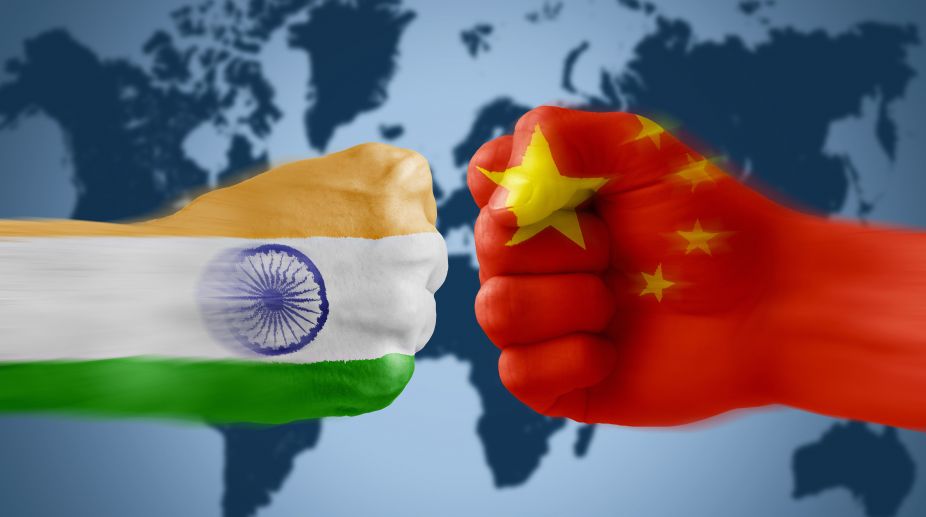A news report over the weekend stated that China has warned India to stay off its ‘own colony’ Sri Lanka. For China, India is a major competitor in Asia. On the one hand, it has suggested that India join the China Pakistan Economic Corridor (CPEC) and One Belt One Road (OBOR) projects which it has initiated while conversely it has ensured that India is kept at a distance in every international forum. While borders remain peaceful, transgressions continue although a strong Indian response indicates that India is capable of responding. The Indo-China border dispute lingers on, with China raking up the Arunachal Pradesh and Dalai Lama issues at frequent intervals. Chinese actions and words have always been at variance.
To embarrass India, it has repeatedly blocked the UN from designating Azhar Masood as an international terrorist despite the West joining hands with India to push the case. It has also prevented India’s entry into the NSG. It would never accept India as an equal in the UNSC. Its support to Pakistan is well known, hence it would never permit anyone to criticise it in any international fora. It continues to arm Pakistan, ensuring that it remains a thorn in India’s military and economic development. Its involvement in the CPEC and Gwadar port only enhances security concerns for India.
Advertisement
China is now seeking to become a dominant power in the sub-continent, offsetting India. While it cannot influence the region directly by political means, it has begun employing its economic lever. It has enhanced its investment in Nepal aiming to reduce Indian influence and has bulldozed its way into Sri Lanka, taking over the Hambantota port on lease for 99 years. Its investments in Myanmar and base in Coco Islands are designed to counter Indian domination in the Indian Ocean. It has provided submarines to Bangladesh as also increased economic investments in the country. China is in secret talks with the Taliban, while seeking to gain leverage in Afghanistan. In the Maldives, with the present government being anti-India, Chinese investments have increased and it is also likely to develop an airport there. The only country where it has yet to make deep forays in India’s vicinity is Bhutan.
Most countries in the sub-continent are economically weak. They desperately seek investments and infrastructure development. Presently, India’s influence in the neighbourhood is such that heads of state make New Delhi their first port of call. While India provides them with aid and seeks to incorporate them in its growth, however being a democracy it takes time before promised investments take root, since funds are dependent on nature of projects, as against China which moves much faster.
A clear case has been the Chabahar Port in Iran. India has yet to make any headway as it still awaits Iran’s response, prior to transferring funds for commencement of the project, while in China’s case, the intention to develop the CPEC was announced in Nov 2014 and it has already been operationalized. In addition, China’s economy is five times the size of India’s.
China’s investment in the region is pushing India to a secondary position. The investment also opens doors for Chinese goods, which are much cheaper and result in reduced Indian imports. Thus, nations end up with an adverse balance of payments which China can subsequently exploit. India’s attempts to challenge Chinese power in both Mongolia and Vietnam made almost no progress. Mongolia buckled under Chinese economic pressure and agreed to never invite the Dalai Lama again, while gently ignoring India’s offer of aid. Vietnam though still in touch with India for military purchases, is moving forward cautiously, mainly due to Chinese offers of investment and development. Even the Philippines, a close US ally, melted to Chinese economic offers and was even willing to break its American shackles.
China may be militarily superior to India, however is unsure of challenging it with an assured measure of success. Hence it follows the transgressions route. It is also aware of Indian influence in the region, which has existed for decades. Further, militarily it cannot influence the region and has therefore commenced employing its economic power to show that economic might can change balance of power in any region.
Simultaneous to investment, Chinese media representing Beijing warns India against interfering, blocking or hampering their investments. A clear case has been the unrest following grant of land in Sri Lanka for which China blamed India. In Nepal’s case, it has warned India against interfering in its investment and development activities once the anti-India government of Oli was replaced. By issuing such statements it conveys a message that it is willing to challenge India for a leadership role in the region.
China’s increasing investments are in the shape of loans; and China leverages these effectively. It has already succeeded in Sri Lanka and would soon do so in Nepal and Maldives. Recent reports indicate that Chinese submarines have begun docking in Chinese-run ports in Sri Lanka, enhancing security concerns for India. While Pakistan is a Chinese province in almost every sense of the term, considering its depth of investment, the others are likely to follow.
India has been observing these developments but has been unable to match Chinese investments or stem its actions. Its only option is to continue diplomatic engagement, as also remain a strong supporter for the region. It needs to monitor Chinese military cooperation with countries of the region. However, diplomatically India needs to tread with caution, as deterioration in ties could easily push fringe nations into the Chinese fold, enhancing security concerns. For countries in the region, playing the India versus China card would benefit them in the short term, as they have nothing to lose while the big brothers battle it out. The long term may be different, when China begins claiming its pound of flesh.
The writer is a retired Major-General of the Indian Army.











